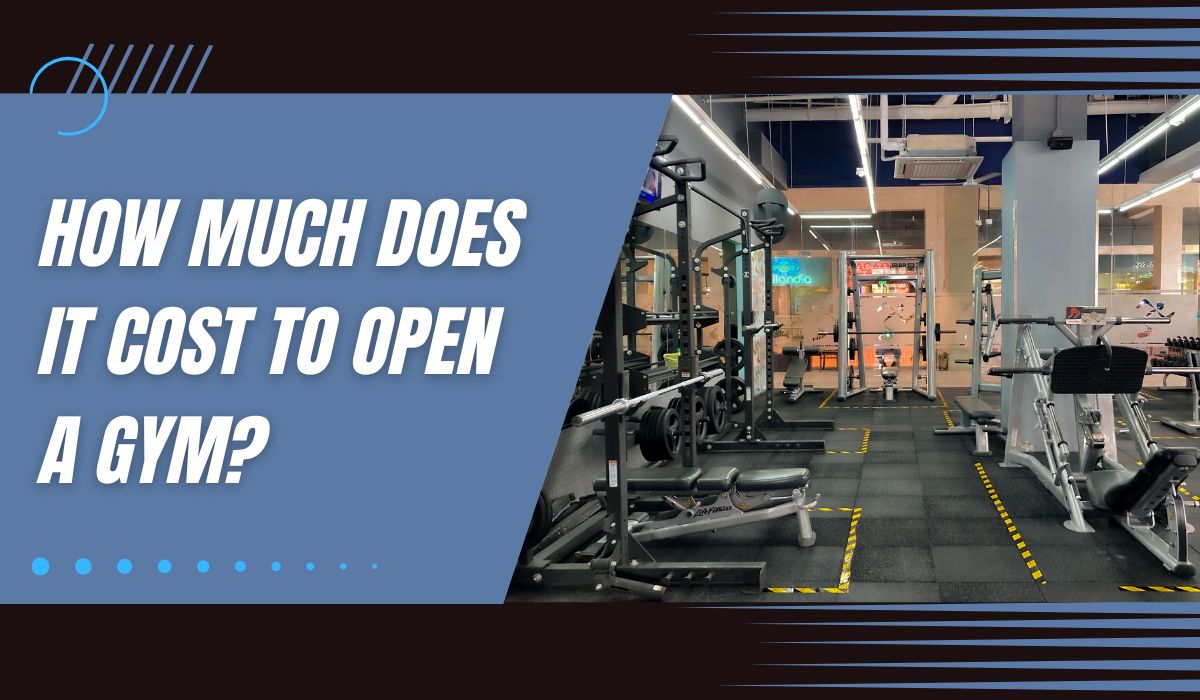With the fitness industry booming, many entrepreneurs see gyms as a lucrative opportunity to make a profit. But before diving into this dynamic business, it's crucial to understand the financial terrain. For businessmen and investors planning to start a gym business, the first question is: How much does it cost to open a gym?
From state-of-the-art equipment and spacious facilities to certified trainers and sophisticated marketing campaigns, the costs can add up quickly. In this comprehensive breakdown, we'll explore the various expenses tied to opening a gym, providing you with the insights needed to build a strong foundation for your fitness empire.
How Much Does It Cost to Open a Gym in the US?
Opening a gym in the U.S. is an ambitious endeavor that comes with a range of costs. The exact amount required to start a gym varies based on numerous factors, including its size, location, type, and the services offered. Unfortunately, there’s no one-size-fits-all answer to the question: How much does it cost to open a gym?
On average, a small boutique or specialized gym might be started for as low as $50,000 to $100,000. In contrast, a comprehensive fitness center in a prime location, equipped with top-tier facilities, could require an investment of $500,000 to $2 million or even more. It's crucial to conduct a detailed business plan and financial forecast to determine the precise investment required for your specific vision and market.
Upfront Costs of Opening a Gym
Opening a gym is a substantial investment, and the costs can vary widely based on several influencing factors. Understanding these variables will not only help in planning your budget but also in making strategic decisions that can optimize your returns. Here are the key factors that influence the upfront costs of opening a gym:
-
Location and Lease: Leasing a gym space in urban areas varies with the neighborhood's appeal and traffic, often costing $15 to $40 per square foot annually. Thus, a 5,000-square-foot area could range from $75,000 to $200,000 yearly. Alternatively, purchasing a property is costlier, with prices from $200,000 in quieter areas to millions in prime urban zones.
-
Equipment: The essence of a gym is its equipment. Cardio machines like treadmills range from $3,000 to $10,000, ellipticals between $2,000 to $5,000, and stationary bikes around $1,000 to $5,000. Strength equipment, including free weights and benches, might cost $20,000 to $50,000, while individual weight machines are priced from $2,000 to $10,000. Specialized equipment, catering to varied workouts, has its distinct pricing, varying with quality and brand.
-
Renovation and Interior Setup: Gym interiors dictate their vibe. Flooring costs lie between $2 and $10 per square foot. Locker rooms and showers, vital for patrons, can range from $10,000 to $100,000, while lighting setups might be $5,000 to $20,000. A good sound system adds another $1,000 to $10,000.
-
Licenses and Permits: To run a gym, various licenses and permits are needed, which could be from $500 to $5,000, depending on the services and location.
-
Insurance: Given the physical nature of gyms, insurance is crucial. A year's insurance down payment can be anywhere between $500 and $5,000.
-
Initial Staff Training: Quality trainers define a gym's reputation. Their training and certification might cost from $500 to $5,000 each.
-
Marketing and Branding: To stand out in the fitness market, branding can range from $2,000 to $10,000. An initial marketing and SEO campaign might set you back $5,000 to $50,000.
-
Technology: Today's gyms rely on tech. Management software costs are between $500 and $5,000, while security setups can be $1,000 to $10,000.
-
Miscellaneous Supplies: Initial supplies, such as towels and cleaning items, can be an additional $2,000 to $10,000.
Monthly Recurring Costs of Operating a Gym
Beyond the initial capital, the monthly recurring expenses form a significant chunk of your operational costs. Here's a more detailed breakdown, inclusive of average costs:
-
Rent or Mortgage: Depending on location and size, monthly rents can range from $5,000 to $30,000. Mortgages, if you've financed your property, might fall in a similar range, albeit with added interest.
-
Utilities: Monthly utilities, which include water, electricity, gas, and internet, can average between $1,500 and $5,000. The cost can spike if you have amenities like pools or saunas that consume more water and power.
-
Equipment Maintenance and Replacement: Allocating $500 to $3,000 per month is prudent to cater for routine servicing and occasional replacements.
-
Salaries and Wages: Depending on the size and staffing model, monthly payroll can range from $10,000 for a smaller gym to upwards of $50,000 for larger establishments with multiple trainers and specialized staff.
-
Cleaning and Sanitation: Monthly cleaning costs, inclusive of staff salaries and supplies, can hover between $1,000 and $4,000.
-
Marketing and Advertising: An ongoing marketing budget might range from $2,000 to $10,000 monthly, depending on the intensity and platforms used.
-
Insurance Premiums: Monthly premiums for comprehensive coverage can vary widely, but a typical range is $500 to $2,000.
-
Loan Payments: If financed, monthly loan repayments (principal + interest) might be between $2,000 and $10,000, depending on the loan's terms.
-
Management Software Subscriptions: Software subscriptions generally cost between $100 to $1,000 monthly, based on features and user limits.
-
Music and Entertainment Licensing: Licensing fees for music or TV programs can range from $50 to $500 monthly, depending on the size of the establishment and the content's scope.
-
Miscellaneous Supplies: Replenishing items like towels, toiletries, and water can add an additional $500 to $2,500 to monthly expenses.
-
Professional Fees: Monthly consultations with accountants, lawyers, or other professionals can add another $500 to $5,000, depending on the complexity of operations and locality.
It's essential to remember that these figures can vary significantly based on several factors: the gym's location, size, offered amenities, and overall management. Regularly reviewing and optimizing these costs can be pivotal in ensuring a profitable operation.
A Closer Look at the Profitability of Gym Businesses
The fitness industry in the U.S. has seen substantial growth over the years, bolstered by an increasing awareness of health and wellness. Gyms and fitness centers have become ubiquitous fixtures in urban and suburban landscapes alike. But does this proliferation translate into profitability?
In the U.S., the earnings of a gym can vary widely based on factors such as location, size, services offered, and target demographic. On average, smaller boutique gyms might earn anywhere from $50,000 to $200,000 annually, depending on their membership pricing, number of members, and ancillary services (like personal training or specialized classes). Larger gyms or chains can see earnings from $500,000 to several million dollars per year.
Projected ROI for Gym Businesses
The Return on Investment (ROI) for gym businesses is equally varied. Generally, a well-run gym in a good location with proper marketing strategies can expect an ROI of around 10% to 15%. However, this percentage can increase significantly for gyms that capitalize on popular trends, offer specialized services, have competitive gym pricing strategies, or are part of well-established franchises.
While gyms can certainly be profitable, their success largely hinges on strategic planning, understanding local demographics, efficient management, and adapting to market demands. The key is not just attracting members but retaining them, offering diversified services, and continuously innovating to stay relevant in a competitive industry.
Is Gym Worth the Investment?
The global fitness industry has seen consistent growth, with a projected rise of $434 billion in 2028. And with the increased awareness of health and wellness, gyms have become an integral part of many people's lives. For those with a passion for fitness and a keen sense of business, investing in a gym can indeed be a rewarding endeavor.
It's essential to understand that while the initial costs of opening a gym can be steep, a well-managed, strategically located, and marketed gym can yield substantial returns in the long run. A gym's profitability doesn't only hinge on its equipment or interiors but on the community it nurtures, the value it offers, and its adaptability to evolving fitness trends.
Frequently Asked Questions
1. How much does it cost to open a gym?
The cost can vary widely based on factors like location, size, and facilities offered. A small boutique gym might start at $50,000 to $100,000, while a high-end fitness center in a prime area might require an investment of $500,000 to $2 million or more.
2. What types of licenses and permits do I need to open a gym?
You'll need a business license, health permits, and possibly specialized permits for amenities like swimming pools or saunas. The exact requirements vary by location and the services offered.
3. How much space is ideal for a gym?
This depends on the gym's concept. A personal training studio might only need 1,000-1,500 square feet, while a larger fitness center with various amenities could require 10,000 square feet or more.
4. Is it better to lease or buy property for a gym?
Leasing is often more feasible for new business owners due to the lower upfront costs. However, buying property can be a valuable long-term investment if you have the capital.
5. How should I market my new gym?
Marketing strategies include online advertising, social media campaigns, promotional events, offering trial memberships, and partnering with local businesses.
Taking the Next Step: Promoting Your Gym Business
In the competitive world of fitness, simply having state-of-the-art equipment or a prime location isn't enough. The true crux of ensuring your gym's success lies in effective promotion. Adopting a robust marketing strategy not only places your gym in the public eye but also sets the tone for your brand's identity and the community you wish to cultivate.
Embrace the power of social media promotions, keep pace with industry trends, and build genuine relationships with your members. Propel your gym business to success!
















